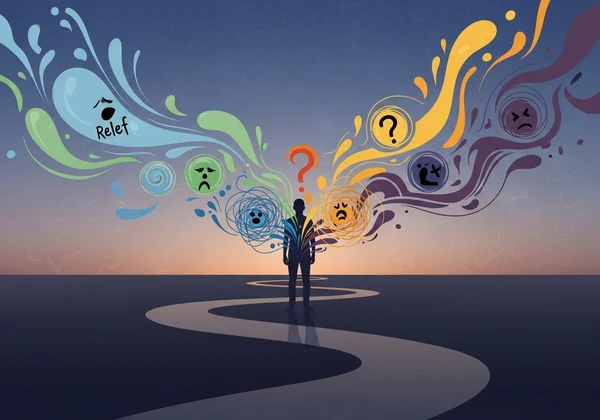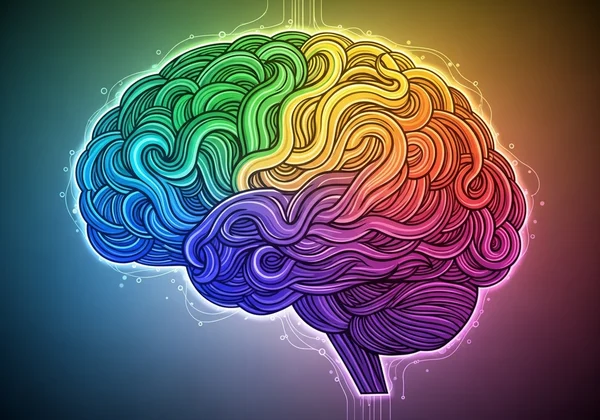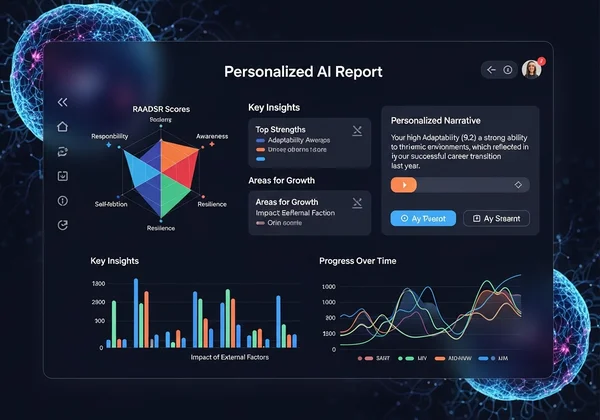ผลการทดสอบ RAADS-R: อารมณ์, การยอมรับ, และขั้นตอนต่อไปสำหรับการคัดกรองออทิซึม
September 15, 2025 | By Elara Vance
การได้รับ ผลการทดสอบ RAADS-R ของคุณเป็นประสบการณ์ที่ลึกซึ้งและซับซ้อน ช่วงเวลานี้อาจรู้สึกเหมือนกับการได้พบชิ้นส่วนปริศนาที่หายไปซึ่งคุณไม่เคยรู้ว่ากำลังตามหาอยู่ ไม่ว่ามันจะนำมาซึ่งความโล่งใจ ความสับสนอย่างฉับพลัน หรืออารมณ์ที่ขัดแย้งกัน บทความนี้พร้อมช่วยคุณนำทางในเส้นทางข้างหน้า คุณอาจกำลังสงสัยว่า ฉันควรตีความผลการทดสอบ RAADS-R ของฉันอย่างไรดีที่สุด? บทความนี้จะช่วยให้คุณจัดการกับความรู้สึก ส่งเสริมการยอมรับตนเอง และนำเสนอขั้นตอนปฏิบัติที่เป็นรูปธรรมบนเส้นทางสู่ความเข้าใจตนเองที่ลึกซึ้งยิ่งขึ้น หากคุณพร้อมที่จะเริ่มต้นการสำรวจนี้ คุณสามารถ เริ่มการประเมินของคุณ ได้ตลอดเวลา
การทำความเข้าใจสภาวะทางอารมณ์ของผล RAADS-R ของคุณ
สิ่งแรกที่ต้องจำคือไม่มีวิธี 'ถูกต้อง' ในการรู้สึก ปฏิกิริยาของคุณถูกต้อง ไม่ว่ามันจะเป็นอย่างไร สำหรับหลายคน โดยเฉพาะผู้ใหญ่ที่ใช้เวลาหลายปีรู้สึกแตกต่างโดยไม่รู้สาเหตุ การเห็นคะแนนที่สอดคล้องกับประสบการณ์ของตนเองช่วยยืนยันความรู้สึกของพวกเขาได้อย่างมาก มันมอบภาษาใหม่เพื่ออธิบายการรับรู้และความท้าทายที่ไม่เหมือนใครตลอดชีวิต การเดินทางเข้าสู่ประเภทระบบประสาทของคุณนี้เป็นเรื่องส่วนตัวอย่างลึกซึ้ง และการให้พื้นที่แก่ตนเองในการรู้สึกคือขั้นตอนแรก

ทำความเข้าใจปฏิกิริยาเบื้องต้นทั่วไปต่อคะแนนของคุณ
หลังจากเสร็จสิ้นการ คัดกรองออทิซึม หลายคนรายงานว่ามีปฏิกิริยาเบื้องต้นที่คล้ายคลึงกัน คุณอาจพบว่าตนเองอยู่ในความรู้สึกทั่วไปอย่างหนึ่งหรือหลายอย่างเหล่านี้ สิ่งที่พบบ่อยที่สุดคือความโล่งใจ—ความรู้สึกว่าความยากลำบากของคุณไม่ใช่ความล้มเหลวส่วนบุคคล แต่เป็นวิธีที่แตกต่างในการรับรู้โลก สิ่งนี้อาจตามมาด้วยช่วงเวลาแห่งความโศกเศร้า การโศกเศร้าต่ออดีตและการสนับสนุนที่อาจขาดหายไป นอกจากนี้ยังเป็นเรื่องปกติที่จะรู้สึกโกรธ หงุดหงิด หรือวิตกกังวลว่าข้อมูลใหม่นี้มีความหมายอย่างไรต่ออนาคตของคุณ อารมณ์เหล่านี้ไม่ได้แยกออกจากกัน มักจะอยู่ร่วมกันและผันผวนเมื่อคุณทำความเข้าใจ
จากความโล่งใจสู่ความท่วมท้น: การประมวลผลความรู้สึกที่ซับซ้อน
เป็นเรื่องปกติที่จะแกว่งไประหว่างความรู้สึกได้รับการยืนยันในชั่วขณะหนึ่ง และความรู้สึกท่วมท้นอย่างสมบูรณ์ในอีกชั่วขณะหนึ่ง การเปลี่ยนแปลงทางอารมณ์ที่ฉับพลันนี้เป็นส่วนหนึ่งตามธรรมชาติของการรวมข้อมูลใหม่เกี่ยวกับตัวตนของคุณ วันหนึ่ง คุณอาจกำลังค้นคว้าเรื่องความหมกมุ่นอย่างตื่นเต้น อีกวันหนึ่ง คุณอาจรู้สึกเป็นอัมพาตจากความคิดที่จะเปิดเผยตัวตนที่ซ่อนไว้มาตลอดชีวิต ให้เวลาตัวเองช้าๆ นี่ไม่ใช่การแข่งขัน แต่เป็นกระบวนการค่อยเป็นค่อยไปของการค้นพบตนเอง จุดเริ่มต้นที่ดีคือการยอมรับความรู้สึกของคุณโดยไม่มีการตัดสิน หากคุณยังไม่ได้ทำ การทำ การทดสอบ RAADS-R ของเรา สามารถเป็นก้าวแรกที่มีคุณค่าในการเดินทางแห่งการสะท้อนตนเองนี้
การยอมรับตนเองในภาวะออทิซึมและเส้นทางความหลากหลายทางระบบประสาทของคุณ
คะแนน RAADS-R ของคุณไม่ใช่ป้ายชื่อ มันคือกุญแจ มันสามารถปลดล็อกวิธีใหม่ในการทำความเข้าใจตนเอง ทำให้คุณสามารถก้าวจากการวิพากษ์วิจารณ์ตนเองไปสู่ การยอมรับตนเองในภาวะออทิซึม นี่เป็นส่วนสำคัญของ เส้นทางความหลากหลายทางระบบประสาท ของคุณ—การมองเห็นโครงสร้างการทำงานเฉพาะตัวของสมองของคุณไม่ใช่ชุดของข้อบกพร่อง แต่เป็นระบบปฏิบัติการที่แตกต่างและถูกต้อง การเปลี่ยนมุมมองนี้เป็นการเสริมสร้างพลังและสามารถเปลี่ยนแปลงความสัมพันธ์ของคุณกับตนเองและโลกรอบตัวคุณได้
การปรับกรอบตัวตนของคุณผ่านมุมมองแบบคนที่มีความหลากหลายทางระบบประสาท
การมองชีวิตของคุณผ่านมุมมอง ตัวตนที่มีความหลากหลายทางระบบประสาท สามารถเปลี่ยนแปลงได้ พฤติกรรมที่คุณเคยวิพากษ์วิจารณ์ว่าเป็น 'แปลก' หรือ 'ไม่เข้าสังคม' อาจถูกเข้าใจว่าเป็นลักษณะออทิสติกที่แท้จริง ความหลงใหลอย่างแรงกล้าในหัวข้อเฉพาะไม่ใช่ความแปลกประหลาด แต่เป็นเครื่องพิสูจน์ถึงความสามารถในการจดจ่ออย่างลึกซึ้ง ความไวทางประสาทสัมผัสไม่ใช่การที่คุณ 'ดราม่า' แต่เป็นการตอบสนองทางระบบประสาทที่แท้จริง การปรับกรอบนี้ช่วยให้คุณมอบความเห็นอกเห็นใจที่คุณสมควรได้รับมาโดยตลอด มันเกี่ยวกับการเรียนรู้ที่จะทำงาน ร่วมกับ สมองของคุณ ไม่ใช่ต่อต้านมัน

การค้นหาชุมชนและประสบการณ์ร่วมกันเพื่อการสนับสนุน
หนึ่งในขั้นตอนที่ทรงพลังที่สุดที่คุณสามารถทำได้คือการเชื่อมโยงกับคนออทิสติกคนอื่นๆ ทันใดนั้น คุณก็ไม่ได้อยู่คนเดียวอีกต่อไป ประสบการณ์ที่คุณคิดว่าเป็นเอกลักษณ์เฉพาะตัวของคุณนั้นถูกแบ่งปันโดยชุมชนที่มีชีวิตชีวาและให้การสนับสนุน แพลตฟอร์มอย่าง Reddit (r/autism, r/AutismInWomen), TikTok (#ActuallyAutistic) และ Twitter ได้กลายเป็นพื้นที่ที่มีคุณค่าอย่างยิ่งสำหรับการค้นหาความเป็นน้ำหนึ่งใจเดียวกันและ การสนับสนุนจากชุมชน การได้ยินเรื่องราวของผู้อื่นสามารถยืนยันประสบการณ์ของคุณเองและให้คำแนะนำที่เป็นประโยชน์สำหรับการนำทางในโลกที่มักถูกออกแบบมาสำหรับคนปกติ การเชื่อมโยงนี้ช่วยต่อสู้กับความโดดเดี่ยวที่ผู้ใหญ่ที่ได้รับการวินิจฉัยล่าช้าจำนวนมากรู้สึก

การสนับสนุนที่จำเป็นหลังการคัดกรอง: ขั้นตอนปฏิบัติถัดไปของคุณ
เมื่อคลื่นอารมณ์เริ่มต้นสงบลง คุณอาจสงสัยว่า "แล้วไงต่อ?" การมีขั้นตอนที่ปฏิบัติได้จริงสามารถช่วยให้คุณตั้งหลักและมีเส้นทางที่ชัดเจนไปข้างหน้า ระยะ การสนับสนุนหลังการคัดกรอง นี้เกี่ยวกับการรวบรวมข้อมูลเพิ่มเติม การแสวงหาการสนับสนุนที่เหมาะสม และการตัดสินใจอย่างมีข้อมูลเกี่ยวกับอนาคตของคุณ โปรดจำไว้ว่านี่คือการเดินทางของคุณ และคุณเป็นผู้ควบคุมจังหวะ
การพูดคุยผลลัพธ์ของคุณกับครอบครัวและเพื่อนที่ไว้ใจได้
การแบ่งปันผลลัพธ์ของคุณอาจเป็นก้าวที่น่ากลัว เริ่มต้นกับคนในชีวิตของคุณที่มีแนวโน้มที่จะเปิดใจและให้การสนับสนุนมากที่สุด คุณไม่จำเป็นต้องบอกทุกคนในคราวเดียว เมื่อคุณแบ่งปัน มันอาจเป็นประโยชน์ที่จะอธิบายว่าการเป็นออทิสติกมีความหมายอย่างไรสำหรับคุณเป็นการส่วนตัว โดยใช้ตัวอย่างเฉพาะจากชีวิตของคุณ เตรียมพร้อมสำหรับปฏิกิริยาที่หลากหลาย และจำไว้ว่าความเข้าใจของพวกเขาอาจต้องใช้เวลา เป้าหมายคือการสร้างระบบสนับสนุนที่เคารพและยืนยันประสบการณ์ของคุณ
การสำรวจทางเลือกและทรัพยากรการประเมินโดยผู้เชี่ยวชาญ
สิ่งสำคัญคือต้องจำไว้ว่าเครื่องมือคัดกรองออนไลน์เช่น การทดสอบ RAADS-R ของเรา มีวัตถุประสงค์เพื่อการสะท้อนตนเองและให้ข้อมูลเท่านั้น ไม่ใช่การวินิจฉัยทางคลินิก หากคุณต้องการได้รับการวินิจฉัยอย่างเป็นทางการ ขั้นตอนต่อไปคือการหานักสุขภาพจิตที่เชี่ยวชาญในการประเมินออทิซึมในผู้ใหญ่ การวินิจฉัยโดยผู้เชี่ยวชาญสามารถช่วยให้เข้าถึงการจัดหาสิ่งอำนวยความสะดวกในที่ทำงานและบริการสนับสนุนอื่นๆ ได้ นี่เป็นการเลือกส่วนบุคคล และหลายคนพบว่าการระบุตนเองนั้นเพียงพอและถูกต้องสำหรับการเดินทางของพวกเขา การสำรวจทางเลือกสำหรับการ คัดกรองออทิซึมฟรี เป็นจุดเริ่มต้นที่ดีเยี่ยม
การใช้ประโยชน์จากรายงาน AI ส่วนบุคคลของคุณเพื่อข้อมูลเชิงลึกที่ลึกซึ้งยิ่งขึ้น
นอกเหนือจากคะแนนมาตรฐาน เรามีเครื่องมือพิเศษที่จะช่วยให้คุณเข้าใจผลลัพธ์ของคุณ: รายงาน AI ส่วนบุคคล ที่เป็นทางเลือก โดยการตอบคำถามเพิ่มเติมเล็กน้อยเกี่ยวกับภูมิหลังและประสบการณ์ส่วนตัวของคุณ AI ของเราสามารถสร้างการวิเคราะห์ที่มีความละเอียดอ่อนมากขึ้นซึ่งเชื่อมโยงคะแนนของคุณกับบริบทชีวิตของคุณ สิ่งนี้สามารถให้ ข้อมูลเชิงลึกจากรายงาน AI ที่เหนือกว่าตัวเลข ช่วยให้คุณเข้าใจว่าลักษณะเฉพาะอาจแสดงออกในชีวิตประจำวัน ความสัมพันธ์ และการทำงานของคุณได้อย่างไร คุณสมบัติที่เป็นนวัตกรรมนี้ได้รับการออกแบบมาเพื่อให้การสำรวจของคุณง่ายขึ้นและชีวิตของคุณสมบูรณ์ยิ่งขึ้น เปลี่ยนผลลัพธ์ของคุณให้เป็นคู่มือปฏิบัติเพื่อความเข้าใจตนเอง คุณสามารถ รับข้อมูลเชิงลึกที่ลึกซึ้งยิ่งขึ้น โดยการสำรวจคุณสมบัตินี้หลังจากการทดสอบของคุณ

เส้นทางแห่งพลังของคุณ: การโอบรับตัวตนที่มีความหลากหลายทางระบบประสาทของคุณ
การได้รับผลการทดสอบ RAADS-R ของคุณไม่ใช่จุดสิ้นสุด มันคือการเริ่มต้นบทใหม่ เป็นการเชิญชวนให้สำรวจตัวตนของคุณด้วยความอยากรู้อยากเห็นและความเห็นอกเห็นใจ ด้วยการนำทางอารมณ์ การโอบรับการยอมรับตนเอง และการดำเนินการตามขั้นตอนปฏิบัติ คุณสามารถก้าวไปข้างหน้าด้วยความชัดเจนและพลังที่ได้รับการฟื้นฟู การเดินทางนี้เกี่ยวกับการโอบรับตัวตนที่เป็นออทิสติกแท้จริงของคุณ
เราสนับสนุนให้คุณใช้ทรัพยากรของเราเพื่อดำเนินการสำรวจต่อไป ทำให้การเดินทางแห่งการค้นพบตนเองง่ายขึ้นและชีวิตของคุณสมบูรณ์ยิ่งขึ้น เริ่มต้นการเดินทางของคุณ ที่หน้าแรกของเราวันนี้ และเข้าร่วมชุมชนที่เติบโตขึ้นเรื่อยๆ ของบุคคลที่มุ่งมั่นที่จะเข้าใจตนเองให้ดียิ่งขึ้น
คำถามที่พบบ่อยเกี่ยวกับผลการทดสอบ RAADS-R และขั้นตอนต่อไป
การทดสอบ RAADS-R มีความแม่นยำสำหรับการสะท้อนตนเองหรือไม่?
การทดสอบที่ได้รับแรงบันดาลใจจาก RAADS-R ของเราเป็นเครื่องมือคัดกรองที่ได้รับการยอมรับสำหรับการระบุลักษณะออทิสติก แม้ว่าจะมีข้อมูลที่เป็นประโยชน์อย่างยิ่งสำหรับการสะท้อนตนเองและสามารถบ่งชี้ได้อย่างชัดเจนว่าคุณอาจอยู่ในช่วงใดของสเปกตรัม แต่ก็ไม่ใช่เครื่องมือวินิจฉัย ความแม่นยำสำหรับการสะท้อนตนเองนั้นสูง แต่ไม่ควรใช้แทนการประเมินอย่างเป็นทางการโดยแพทย์ผู้มีคุณสมบัติ
คะแนนสูงในการทดสอบ RAADS-R หมายความว่าอย่างไร?
คะแนนสูงบ่งชี้ว่าคุณมีลักษณะจำนวนมากที่เกี่ยวข้องกับออทิซึมโดยทั่วไป มันบ่งชี้ว่าการสำรวจเพิ่มเติมหรือการประเมินโดยผู้เชี่ยวชาญอาจเป็นประโยชน์ สิ่งสำคัญคือการมองคะแนนไม่ใช่เป็นป้ายชื่อที่ชัดเจน แต่เป็นจุดข้อมูลเพื่อนำทางการค้นพบตนเอง รายงาน AI ส่วนบุคคล ของเราสามารถช่วยให้บริบทเพิ่มเติมว่าคะแนนสูงมีความหมายอย่างไรสำหรับคุณโดยเฉพาะ
ฉันสามารถวินิจฉัยออทิซึมด้วยตนเองจากผลการทดสอบ RAADS-R ได้หรือไม่?
แม้ว่าการทดสอบ RAADS-R จะเป็นเครื่องมือที่ทรงพลัง แต่ก็ไม่เพียงพอสำหรับการวินิจฉัยอย่างเป็นทางการ อย่างไรก็ตาม การวินิจฉัยตนเอง หรือที่แม่นยำกว่านั้นคือการระบุตนเอง เป็นเส้นทางที่ถูกต้องและได้รับการยอมรับสำหรับหลายคนในชุมชนออทิสติก ซึ่งมักจะตามมาด้วยการวิจัยอย่างกว้างขวางและการสะท้อนตนเองด้วยเครื่องมือเช่นของเรา การวินิจฉัยอย่างเป็นทางการสามารถให้ได้โดยผู้เชี่ยวชาญด้านสุขภาพเท่านั้น
ฉันควรตีความผลการทดสอบ RAADS-R ของฉันอย่างไรดีที่สุด?
ตีความผลลัพธ์ของคุณด้วยความอยากรู้อยากเห็นและความเห็นอกเห็นใจตนเอง ใช้เป็นกรอบในการทำความเข้าใจประสบการณ์ในอดีตและความต้องการในปัจจุบันของคุณ ดูคะแนนย่อย (การเกี่ยวข้องทางสังคม ภาษา ฯลฯ) เพื่อดูว่าลักษณะของคุณเด่นชัดที่สุดในส่วนใด เราขอแนะนำอย่างยิ่งให้ใช้คะแนนเป็นจุดเริ่มต้นสำหรับการอ่านเพิ่มเติม การเชื่อมโยงกับชุมชน และการพิจารณา เครื่องมือสะท้อนตนเอง ของเราเพื่อการวิเคราะห์ที่ลึกซึ้งยิ่งขึ้น
รายงาน AI ส่วนบุคคลให้ข้อมูลเชิงลึกเฉพาะเจาะจงอะไรบ้าง?
รายงาน AI ส่วนบุคคลนั้นเหนือกว่าคะแนนง่ายๆ มันวิเคราะห์คำตอบของคุณร่วมกับบริบทส่วนตัวของคุณเพื่อนำเสนอเรื่องราวที่ปรับแต่งได้ มันอาจเน้นจุดแข็งที่อาจเกิดขึ้น อธิบายว่าลักษณะบางอย่างอาจมีปฏิสัมพันธ์กันอย่างไร และนำเสนอข้อมูลเชิงลึกส่วนบุคคลในด้านต่างๆ เช่น ความไวทางประสาทสัมผัสหรือรูปแบบการสื่อสารทางสังคม ทำให้คุณมีความเข้าใจตนเองที่ลึกซึ้งยิ่งขึ้น